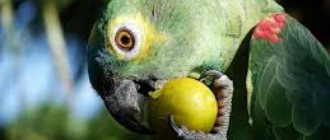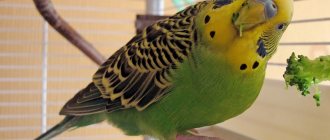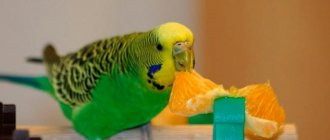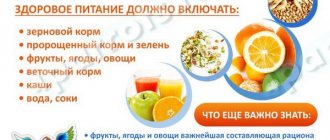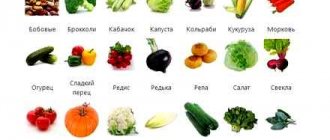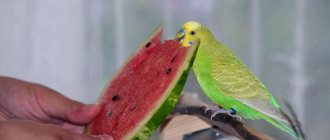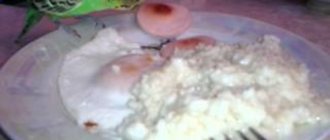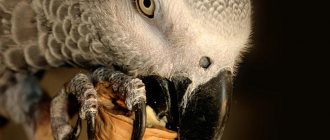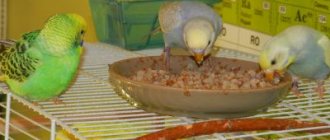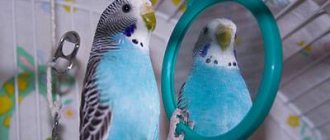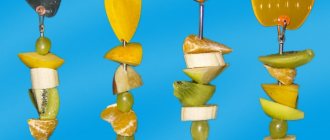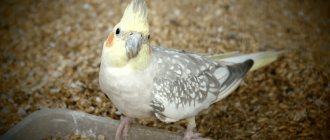To give or not to give sweet fruit
In the wild, parrots eat nuts, grain feed, fruits and bananas, among others. Therefore, it is possible and even necessary to include them in your pet’s diet. Considering the wide distribution of bananas in bird habitats, for them it is not an exotic, but a completely familiar product.
Banana is not a tree, but a herbaceous plant. The ubiquitous expression “banana palm” in no way refers to botany. Here we have giant shoots that bear fruit only once, where new stems grow in place of faded grass.
Is it possible to give parrots bananas?
Bananas are nutritious and healthy fruits. They contain a large amount of vitamins, micro and macroelements, as well as carbohydrates and other nutrients necessary for the bird’s body. Nutrients are in accessible form and are easily absorbed by the bird's body. Parrots tolerate feeding these fruits well; If bananas are fresh, they will not cause diarrhea or allergies. In this regard, this product must be included in the diet of pet parrots.
However, you cannot feed birds only fruits. The basis of the daily diet should be grain; sweet fruits are given only occasionally and little by little, as a delicacy.
Beneficial properties for birds
Dessert varieties can be eaten raw. These are exactly the bananas that we are used to seeing on store shelves.
Species differences are characterized by the color of the peel and the size of the fruit. The most common varieties are Lady Finger, Mysore, Cavendish, Robusta and Lactan.
Some are convinced that large and long bananas are forage varieties of the fruit. In fact, the taste of the fruit depends on the harvest period and the specific variety.
100 grams of dessert banana contains:
- water – 75%;
- calories – 90;
- carbohydrates – 23 g;
- sucrose – 12.5 g;
- fiber – 2.5 g;
- protein – 1.2 g;
- fats – 0.3 g.
Depending on the variety, the composition of the fruit may vary, but only slightly. Many nutritionists consider the chemical composition of bananas to be so balanced and harmonious that it is almost impossible to create it under artificial conditions. If you regularly give your bird fresh fruit, it will only benefit it.
The cardiovascular system
The potassium and magnesium contained in bananas have a beneficial effect on the cardiovascular system of poultry. The elements reduce the likelihood of oxygen starvation of brain cells and also contribute to the normalization of water-salt balance.
Gastrointestinal tract
The abundance of fiber has a positive effect on the pet’s gastrointestinal tract. Many veterinarians recommend bananas as an aid after poisoning or for oral lesions. Vitamin D also helps birds absorb calcium, which is especially important for young animals.
CNS
The biogenic amines included in the composition have a noticeable effect on the central nervous system of the parrot. Breeders and ornithologists recommend giving bananas during the period of bird adaptation to a new place of residence. Serotonin and dopamine will help your pet calm down, reducing stress levels.
The B vitamin group helps maintain the bird’s brain activity. This is especially important when the task is to teach a parrot human speech or some other tricks.
Immunity
Bananas contain almost a complete set of vitamins C. The latter help the bird’s body fight infections. Moreover, vitamin C speeds up the healing process of wounds. Regular consumption of bananas helps strengthen the bird's immune system.
Is it possible to have an overseas fruit?
Is it possible and how often should you pamper your budgie with a banana? The main food product of these birds is grain, but they certainly need other products to diversify their diet. Despite the fact that commercial food for parrots is balanced, owners add vitamins to it to improve the health of the birds.
Experienced poultry farmers recommend offering bananas as a supplement or treat, but in no case as the main diet. Although the nutritional value of these fruits is sufficient, they are not able to provide complete nutrition. Therefore, beginners, when they find out whether it is possible to give a banana to a budgie often, are advised not to get carried away and not to use bananas as the basis of the diet.
New food is always perceived with caution, so it is necessary to give your pet time to get used to it and try a previously unknown product. To speed up the process, it is recommended to show the bird that the offered fruit is tasty and edible. To do this, you should peel the fruit before the enclosure and bite off a small piece yourself, and then offer the slice to the parrot. But is it possible to indulge in bananas when budgies don’t like them? In this case, there is no need to insist by offering a new product too often.
Important! The fruit is very high in calories, so you should not give it to birds in large quantities to prevent them from gaining excess weight.
Can there be harm?
Alas, bananas are one of the fruits that have a number of contraindications. Here, a lot depends on the breed of the pet, the conditions of detention and its well-being. When the first signs of a painful condition appear, it is advisable to completely stop feeding the bird fruit and contact a veterinarian.
Bananas are digested more slowly than apples, apricots or pears. Therefore, they should not be given to birds suffering from obesity. Many owners who are inexperienced in these matters overfeed their pets without noticing it . Obesity is not only difficult to treat, but also takes a very long time. The daily calorie intake must be strictly observed, taking into account the type of parrot.
The elements contained in bananas contribute to the rapid removal of fluid from the body, which can lead to blood thickening. In advanced cases, the bird becomes lethargic and indifferent to its surroundings. Some parrots may experience bloating after eating bananas.
You should also take into account the quality component of the product. Fruits grown in artificial environments often contain carcinogens and other substances harmful to birds. The human body can still cope with the abundance of pesticides in products, but in birds the immune system is practically powerless against them.
Bananas for birds should be purchased in trusted places, for example, in large chain stores. The latter will not display goods without the appropriate certificates. Whereas markets noticeably lose in terms of compliance with sanitary standards and rules, even despite the visual appeal of the fruit.
What to consider
In general, the rules are quite simple: it is recommended to give a banana no more than 2-3 times a week (1-2 pieces). It is advisable to take into account some nuances to improve the health of your pet:
- You should not offer a banana without peeling it first. Since these fruits grow far beyond the borders of our country, they are treated with chemicals during transportation to preserve their presentation.
- The fruits should not be overripe.
- You definitely need to pay attention not only to the appearance, but also to the shelf life of the product.
Banana is the main source of fructose, glucose and natural sugars - energy suppliers. The bird will always be cheerful and in a good mood. All this information gives a clear answer as to whether it is possible to give budgies a banana.
How to give correctly and in what quantities
It all depends on the breed and personal preferences of the pet. For example, for budgerigars, one centimeter-thick cross-section per day is enough. Whereas large birds, such as cockatoos or grays, can be given 3-4 slices.
If the bird has not yet gotten used to the new place and is not accustomed to human hands, then the fruit should be served using a special holder. You can buy them at almost any pet store. The pieces should not be placed on a tray or added to grain feed. The fruit should be served separately or as a paste in combination with other products.
Are banana peels safe for parrots?
Your colorful pal can enjoy their banana peels as long as they are grown organically. Banana peels are rich in catechins, which have antimicrobial, antioxidant and cholesterol-lowering properties.
The peel is also rich in energy. However, most store-bought bananas are grown in pesticide-laden environments, making their peels unsafe to eat. The huge amount of chemicals in them can cause illness.
You may be tempted to wash your bananas first before giving them to your birds, but this does not make the peel safe for your parrot. Some dangerous pesticides will still end up in your feathered friend's intestines.
How to train a bird to eat fruit if it won't eat it.
The bird's conservatism regarding fruits can only be overcome with ingenuity and perseverance. The first and easiest way is to regularly try to offer your pet a treat. Eventually he will give in and try the banana. In a good half of the cases, one successful attempt is enough for the bird to appreciate the fruit and not refuse it in the future.
The second way is your own example. Parrots are excellent imitators, and if they see with what pleasure a person eats a banana, they will probably want to repeat the actions of their owner. You can also offer treats in a playful way. For example, by attaching a piece of banana to your pet’s favorite toy. In pet stores there are special devices for such cases - forage bags. These are small containers that resemble a mini-cage where you can put pieces of fruits and vegetables.
In difficult cases, the banana is crushed and mixed with other products. With the next attempts, the smell, and at the same time the taste, will no longer be so suspicious for the pet.
Some owners accustom birds to new foods by exploiting the feeling of hunger. This approach is unacceptable in principle. At best, the pet will hate the food offered, and at worst, serious problems with the gastrointestinal tract will appear.
How to properly feed a parrot bananas
Bananas contain a lot of sugars. If you feed your parrot this product too often, it may develop diabetes. In addition, these fruits are very high in calories, and eating them in large quantities can lead to obesity. Therefore, parrots should be given bananas no more than 1-2 times a week.
On a note! Before feeding the product to the bird, it is necessary to peel it. Fruits are treated with chemicals so that they do not spoil during transportation and storage; these toxic compounds accumulate in the skin and can poison the bird.
The fruits should not be green or overripe. Bananas to be fed to parrots should have an even yellow color. Overripe fruits contain increased amounts of sugars; in addition, they can cause flatulence in the bird.
The peeled fruits are cut into pieces and placed in a feeder or hung from the bars of the cage. If the bird refuses to eat an unfamiliar type of food, you can offer it a whole fruit. It is convenient to hang it at the top of the cage or secure it between the bars so that splashes of water, other food and debris do not fall on it. Many parrots like to play with a large piece or whole fruit and bite off pieces of it as they play.
Because banana has a sweet taste and is a favorite treat for many birds, it can be used as a reward for training or hand-training. A tasty fruit will help improve your relationship with your newly acquired parrot. It is also given after unpleasant manipulations (for example, trimming nails or medical procedures) as a reward for the bird’s patience; In addition, the treat helps restore the bird’s trust in the person.
How to give your bird vegetables
Vegetables contain a lot of fiber, selenium, calcium and zinc. These substances are needed by your feathered pet. Some vegetables can be given without special preparation, just wash and chop:
Vegetables contain a lot of fiber, selenium, calcium and zinc, and your feathered pet needs all these substances
Radishes are useful not only for the root crop, but also for the leaves. It is enough to wash everything well and put it in the cage. Sweet peppers are given along with the seeds.
Some vegetables require boiling water to be poured over them:
The turnips are served to the poultry along with herbs, previously blanched in boiling water. Corn can be fed on the cob, but you just need to choose young, soft grains. The parrot will then play with the stalk.
Can budgies eat tangerines and other citrus fruits?
Citrus fruits contain growth and energy vitamin C. Birds need it. The peel contains essential oils and many birds like to nibble on the top more than they like to eat the flesh. Can parrots eat tangerines in the form they are sold in the store? No. Only local citrus fruits need to be washed with water and cut for the bird.
Citrus fruits contain growth and energy vitamin C, which is essential for birds.
Imported fruits are all treated to prevent fungal infection and spoilage. They must be peeled or thoroughly washed and doused with boiling water. It is better to peel lemons, oranges and tangerines.
